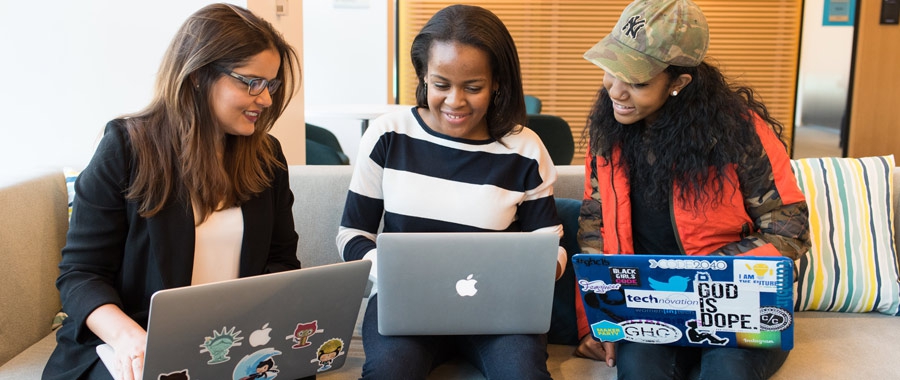The views expressed in our content reflect individual perspectives and do not represent the authoritative views of the Baha'i Faith.
How can I find organizations or teams that fit with my values?
Similar to the struggle of finding friends and a significant other who complement my beliefs and aims, it can be hard to find professional relationships that fit my needs.
As a young black woman, I know that it can be difficult to even find a place that offers me the respectful and equitable relationships everyone deserves.
Even though our reality does not yet reflect the ideal of equality, the Baha’i writings often address why we should treat all human beings alike:
All prejudices, whether of religion, race, politics or nation, must be renounced, for these prejudices have caused the world’s sickness. It is a grave malady which, unless arrested, is capable of causing the destruction of the whole human race. – Abdu’l-Baha, Paris Talks, p. 146.
But when I chat with my black girlfriends it becomes abundantly clear that we have all witnessed this “grave malady” in the workplace. We often bear the brunt of anger when something goes wrong. Folks talk down to us, ignore our needs, and prioritize other voices over ours. Maybe they subconsciously believe the “strong black woman” stereotype, and convince themselves that we can handle hostility and mistreatment. But the reality is that, despite our resilience, we are also deeply emotional. We get hurt, fed up, angry, and flustered just like everyone else. We are human, and these toxic superhuman expectations silence us.
Most people would say that they know this, but unfortunately our colleagues or supervisors often act like they don’t. Knowingly or unknowingly, their biases run the show.
Even when I worked in an organization explicitly focused on liberating black and brown people from the oppressive force of mass incarceration, my supervisor underestimated me and treated me unfairly, giving preference to my white coworkers. While her intentions did not seem malicious, my blood pressure rose every time something unjust happened. If my supervisor couldn’t even treat her white and black interns equitably, what did that mean for the folks the organization was working with?
Sometimes in these situations it’s possible to find ways to manage the stress and focus on the meaningful aspects of the work, rather than the mistreatment. I was able to hang in there because I became close friends with the person who was being preferred over me. Even though she wasn’t a black woman, she was acutely aware that she was being treated better than I was. Having someone to talk to about how to confront the racism helped me immensely. I also knew that it was a short-term role, so the end of my challenges was imminent.
I clung to this quote from the Baha’i teachings to find purpose in this difficult situation. I tried to view this as an opportunity for us to help each other grow:
Whatever shortcomings exist among us must be remedied. For example those who are ignorant must be educated so that they may become wise; the sick must be treated until they recover; those who are immature must be trained in order to reach maturity; those asleep must be awakened. All this must be accomplished through love and not through hatred and hostility. – Abdu’l-Baha, The Promulgation of Universal Peace, p. 444.
Among my group of friends, many of us stay in draining professional situations in hopes that they will change, knowing that growth is painful. If we see hope for our work environment, maybe we just need to continue to build friendships with the people who are like-minded and advocate for us. Sometimes, with patience, a previously brutal manager can become more empathic. People can learn, overcome their stereotypes, and change over time.
Though the journey might be tiresome and feel unrewarding at times, this is sometimes an option. But there are other times when it doesn’t feel like an option. The circumstances squash our hopes and the incoherence is just too stark. Sometimes, the toxicity brings out the worst in us, and makes it difficult for us to be the kinds of people we want to be. The question then becomes: how much can we handle?
Consistently being talked down to can be distracting from work. We are not always at work to try and transform the minds and souls of everyone around us, a lot of times our focuses are on other aims. Sometimes, to even be able to be effective, we need to immerse ourselves in circumstances that allow us to focus. The Baha’i writings say:
So long as the thoughts of an individual are scattered he will achieve no results, but if his thinking be concentrated on a single point wonderful will be the fruits thereof. One cannot obtain the full force of the sunlight when it is cast on a flat mirror, but once the sun shineth upon a concave mirror, or on a lens that is convex, all its heat will be concentrated on a single point, and that one point will burn the hottest. Thus is it necessary to focus one’s thinking on a single point so that it will become an effective force. – Abdu’l-Baha, Selections From the Writings of Abdu’l-Baha, pp. 110-111.
While many might think that the most compassionate and gracious thing to do is to continue working despite facing hardship after hardship, our effort and work is a service. We also deserve dignity. We have to decipher for ourselves if a role or a relationship is redeemable. Our ancestors fought too hard and long for us to feel forced to work under unjust conditions. In honor of the sacrifices they’ve made for us, we are free to choose which battles we pick to fight.
If we consistently feel forced to work with toxicity, it may be time for us to find a new place – and that, too, can be an act of compassion.
















Comments
Sign in or create an account
Continue with Googleor